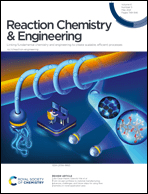
Reaction Chemistry & Engineering
Scope & Guideline
Advancing the Frontiers of Chemical Engineering
Introduction
Aims and Scopes
- Reaction Engineering Innovations:
The journal covers research on novel reactor designs, including continuous flow reactors, microreactors, and photoreactors, emphasizing their role in improving reaction efficiency and selectivity. - Catalysis Research:
A core focus is on the development and optimization of catalysts, including homogeneous and heterogeneous systems, to enhance reaction rates and product yields. - Sustainable Chemistry:
Research promoting green and sustainable practices in chemical synthesis, including the use of renewable feedstocks, waste valorization, and environmentally friendly solvents. - Computational Chemistry and Modeling:
The journal includes studies utilizing computational methods to model reaction kinetics, mechanisms, and thermodynamics, driving predictive capabilities in reaction engineering. - Biocatalysis and Enzyme Engineering:
There is a significant emphasis on the use of biocatalysts and enzyme engineering for chemical transformations, highlighting their advantages in selectivity and environmental impact. - Process Intensification:
Research aimed at enhancing the efficiency of chemical processes through innovative approaches, including the integration of reaction and separation steps, and the development of novel operational strategies.
Trending and Emerging
- Machine Learning in Chemistry:
There is a growing trend towards the application of machine learning and data-driven approaches for reaction optimization and kinetic modeling, providing researchers with powerful tools for enhancing chemical processes. - Integrated Process Design:
Emerging themes include the design of integrated processes that combine reactions with separations and purifications in a single setup, highlighting the shift towards more efficient and sustainable chemical manufacturing. - Photochemical and Electrochemical Processes:
Research on photochemical and electrochemical reactions is on the rise, particularly in the context of renewable energy applications and the development of new catalytic systems for CO2 reduction. - Sustainable and Green Chemistry:
An increasing emphasis on sustainability is evident, with more studies focusing on eco-friendly solvents, renewable feedstocks, and the minimization of waste in chemical processes. - Advanced Characterization Techniques:
There is an emerging focus on the use of advanced characterization techniques, such as in situ and operando methods, to gain deeper insights into reaction mechanisms and catalyst behavior.
Declining or Waning
- Traditional Batch Processes:
There is a noticeable decrease in research focused on traditional batch processes as more researchers gravitate towards continuous flow systems and integrated approaches that offer better scalability and efficiency. - Classical Organic Synthesis:
Papers centered on classical organic synthesis techniques are becoming less frequent, with a shift towards more innovative and efficient synthetic methodologies that leverage automation and advanced catalytic systems. - Conventional Homogeneous Catalysis:
Research on traditional homogeneous catalytic processes is waning, as the field increasingly favors heterogeneous catalysis and biocatalysis for their advantages in recyclability and selectivity.
Similar Journals
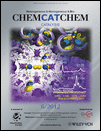
ChemCatChem
Advancing Catalysis and Chemistry for a Brighter Tomorrow.ChemCatChem is a leading international journal published by WILEY-V C H VERLAG GMBH that has been making significant contributions to the fields of catalysis, inorganic and organic chemistry, as well as physical and theoretical chemistry since its inception in 2009. With an established reputation for excellence, this journal holds commendable rankings in various categories, including Q1 in Inorganic Chemistry and Q1 in Organic Chemistry, demonstrating its pivotal role in advancing scientific knowledge and innovation. Notably, it has achieved a high Scopus ranking, securing 10th place out of 79 in Inorganic Chemistry, among others, showcasing its influence and quality. Although open access options are not available, the journal offers cutting-edge research articles, reviews, and insights that are vital for researchers, professionals, and students aiming to stay at the forefront of chemical science. With its address rooted in Weinheim, Germany, and convergence projected to continue until 2024, ChemCatChem remains a dynamic platform for disseminating vital advancements within the chemical community.
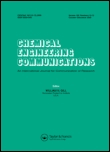
CHEMICAL ENGINEERING COMMUNICATIONS
Fostering Collaboration in Chemical Engineering Excellence.Chemical Engineering Communications, published by Taylor & Francis Inc, is a distinguished journal within the realms of Chemical Engineering and Chemistry. With an ISSN of 0098-6445, this journal plays a pivotal role in disseminating innovative research, critical reviews, and insightful discussions that encompass a broad spectrum of topics in these fields. The journal boasts a commendable Q2 ranking in the 2023 category of chemical engineering and general chemistry, reflecting its significant contribution to the scientific community. Operating under a rigorous peer-review process, the journal attracts high-quality submissions from global researchers. Although currently not an Open Access journal, it provides extensive archive access for users interested in exploring past advancements from its inception in 1973 through to 2024. With a commitment to advancing knowledge and fostering collaboration among academia and industry, Chemical Engineering Communications remains an essential resource for professionals and students aiming to stay abreast of the latest developments in chemical sciences.
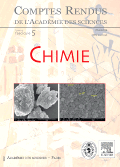
COMPTES RENDUS CHIMIE
Innovating Chemistry: Your Gateway to Cutting-Edge Research.COMPTES RENDUS CHIMIE, published by the prestigious Académie des Sciences in France, stands as a significant journal in the fields of chemistry and chemical engineering. With an ISSN of 1631-0748 and an E-ISSN of 1878-1543, this open-access journal has been committed to disseminating high-quality research since its transition to open access in 2020. Featuring a diverse array of studies, the journal covers innovative research trends and applications, while maintaining a Q3 category ranking in both Chemical Engineering (miscellaneous) and Chemistry (miscellaneous) as of 2023. Its Scopus rankings, positioning at #251 out of 408 in general chemistry and #169 out of 273 in general chemical engineering, highlight its growing impact within the scientific community. Authored by a global cohort of scientists and researchers, COMPTES RENDUS CHIMIE is dedicated to the advancement of knowledge and sharing insights that are vital for ongoing research and development in the chemical sciences. Located in the heart of Paris at 23 Quai de Conti, 75006, France, the journal is an essential resource for those passionate about chemistry and engineering disciplines, fostering collaboration and innovation across the world.

Frontiers of Chemical Science and Engineering
Driving Breakthroughs in Environmental SustainabilityFrontiers of Chemical Science and Engineering is an esteemed journal published by SPRINGER, dedicated to advancing the rapidly evolving domain of chemical engineering. Located in New York, USA, this journal provides a vibrant platform for disseminating groundbreaking research and innovative methodologies in the field. With an impressive Q1 ranking in Chemical Engineering and a Scopus ranking of 54 out of 273, it occupies a prominent position, reflecting its high impact and relevance among academic circles. Since its inception in 2011, it has fostered interdisciplinary collaboration, encompassing diverse topics such as process engineering, environmental sustainability, and nanotechnology, making it a vital resource for researchers, professionals, and students alike. The journal's open access policy further enhances accessibility, ensuring that cutting-edge research is readily available to a global audience. As the field continues to evolve, contributions to Frontiers of Chemical Science and Engineering play an essential role in shaping future advancements and empowering the next generation of engineers.
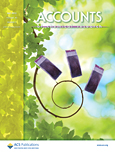
ACCOUNTS OF CHEMICAL RESEARCH
Bridging Disciplines: Where Chemistry Meets MedicineACCOUNTS OF CHEMICAL RESEARCH, published by the American Chemical Society, is a premier journal dedicated to advancing the field of chemistry and its applications in medicine. With an impressive impact factor and recognition as a Q1 journal in both chemistry and medicine categories, it ranks among the top-tier publications, exhibiting an outstanding Scopus rank of 8 out of 408 in general chemistry, placing it in the 98th percentile. This journal has been a vital source of innovative and significant research since its inception in 1968, and it aims to provide a platform for high-quality research articles, reviews, and critical essays that bridge the gap between chemical research and clinical implications. While it is not an open-access publication, the insights available in Accounts of Chemical Research are invaluable for researchers, professionals, and students seeking to explore the latest developments and interdisciplinary approaches within the dynamic fields of chemistry and medicine.

RUSSIAN CHEMICAL BULLETIN
Fostering Collaboration in the World of Chemical Science.RUSSIAN CHEMICAL BULLETIN, published by SPRINGER, serves as a pivotal resource in the field of general chemistry, covering a wide array of topics that impact both theoretical and applied chemistry. With an ISSN of 1066-5285 and a presence since 1993, this journal provides a platform for disseminating significant research findings, practical applications, and novel methodologies within the broader chemistry community. While it currently holds a Q3 ranking in the Chemistry (miscellaneous) category and occupies the 230th position out of 408 in the Scopus rankings, its reputation continues to grow, fostering collaboration and innovation among researchers and professionals alike. Although the journal does not offer an open-access model, it is committed to making findings accessible within the academic community, ensuring that valuable insights can inform future research. With an anticipated convergence of studies extending to 2024, the RUSSIAN CHEMICAL BULLETIN remains an essential reference for those dedicated to advancing chemical science.

Journal of Industrial and Engineering Chemistry
Pioneering Research in Industrial ChemistryThe Journal of Industrial and Engineering Chemistry, published by Elsevier Science Inc, stands as a premier platform since its inception in 1996, dedicated to the dissemination of innovative research in the field of Chemical Engineering. Located in South Korea, this influential journal has established itself with an impressive impact factor and is categorized in the Q1 quartile for chemical engineering (miscellaneous), ranking in the top 12% of its category according to Scopus. With a focus on cutting-edge industrial applications, the journal covers a diverse range of topics including chemical processes, engineering innovations, and sustainable practices, appealing to a broad spectrum of researchers, professionals, and students. Although currently not open access, the journal offers a wealth of resources for advancing knowledge and driving forward the chemical engineering discipline. The converged years from 1996 to 2024 reflect its ongoing commitment to excellence and timeliness in publishing high-quality research.
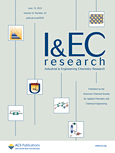
INDUSTRIAL & ENGINEERING CHEMISTRY RESEARCH
Shaping the Future of Industrial and Engineering ChemistryINDUSTRIAL & ENGINEERING CHEMISTRY RESEARCH, published by the American Chemical Society, is a pivotal journal that disseminates high-quality research in the fields of Chemical Engineering, Chemistry, and Industrial and Manufacturing Engineering. With an impressive impact factor, this journal ranks in the top quartile (Q1) across multiple categories, reflecting its significance and influence within the scientific community. Since its inception in 1987, IECR has provided a platform for researchers, professionals, and students to publish innovative findings that advance the understanding and application of engineering chemistry. Though it operates under a subscription model, the journal continues to foster collaboration within the field, inviting contributions that span theoretical advancements, experimental studies, and practical applications. Whether you are engaged in academia or industry, IECR serves as a vital resource for staying abreast of the latest developments in chemical and engineering research.

Reaction Kinetics Mechanisms and Catalysis
Transforming Theoretical Chemistry into Practical ApplicationsReaction Kinetics Mechanisms and Catalysis is an esteemed academic journal published by SPRINGER, specializing in the fields of catalysis and physical and theoretical chemistry. With ISSN 1878-5190 and E-ISSN 1878-5204, this journal serves as a crucial platform for researchers and professionals to disseminate and engage with cutting-edge findings in reaction kinetics, catalytic processes, and mechanistic insights. Operating under an open access model, the journal ensures broad accessibility to its content, enhancing its impact within the scientific community. As of 2023, it is positioned in the Q4 category in catalysis and Q3 in physical and theoretical chemistry, reflecting its growing influence, yet also its potential for further advancement. Aiming to foster collaborations and innovations, Reaction Kinetics Mechanisms and Catalysis is poised to continue shaping the discourse in its field, making it an essential read for researchers, students, and industry professionals alike.

Frontiers in Chemical Engineering
Pioneering Discoveries in Chemical ScienceFrontiers in Chemical Engineering is an esteemed open-access journal published by Frontiers Media SA, dedicated to advancing knowledge in the dynamic field of chemical engineering. Since its inception in 2019, this journal has rapidly gained recognition for its rigorous peer-reviewed articles and innovative research contributions, achieving notable quartile rankings such as Q2 in Chemical Engineering and Q3 in both Bioengineering and Catalysis by 2023. With an emphasis on providing accessible and cutting-edge research, the journal caters to a diverse audience of researchers, professionals, and students interested in the latest developments and methodologies within the chemical engineering discipline. Hailing from Lausanne, Switzerland, Frontiers in Chemical Engineering embodies a commitment to enhancing collaborative scientific communication, making crucial research findings available without barrier. By publishing high-quality articles that address both theoretical advancements and practical applications in chemical engineering, this journal serves as a pivotal resource for fostering innovation and collaboration across the global research community.